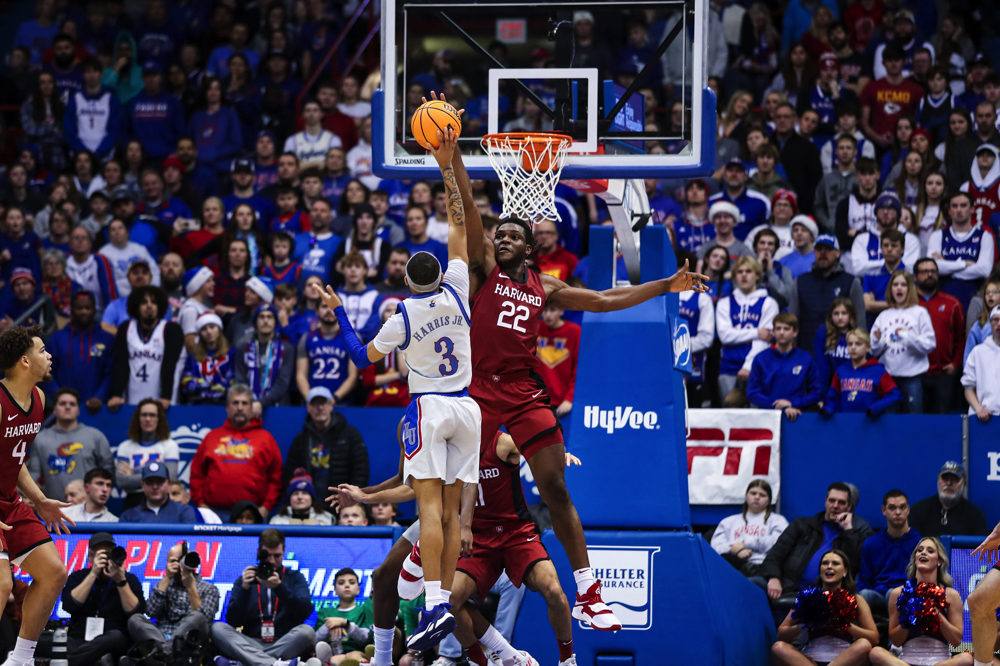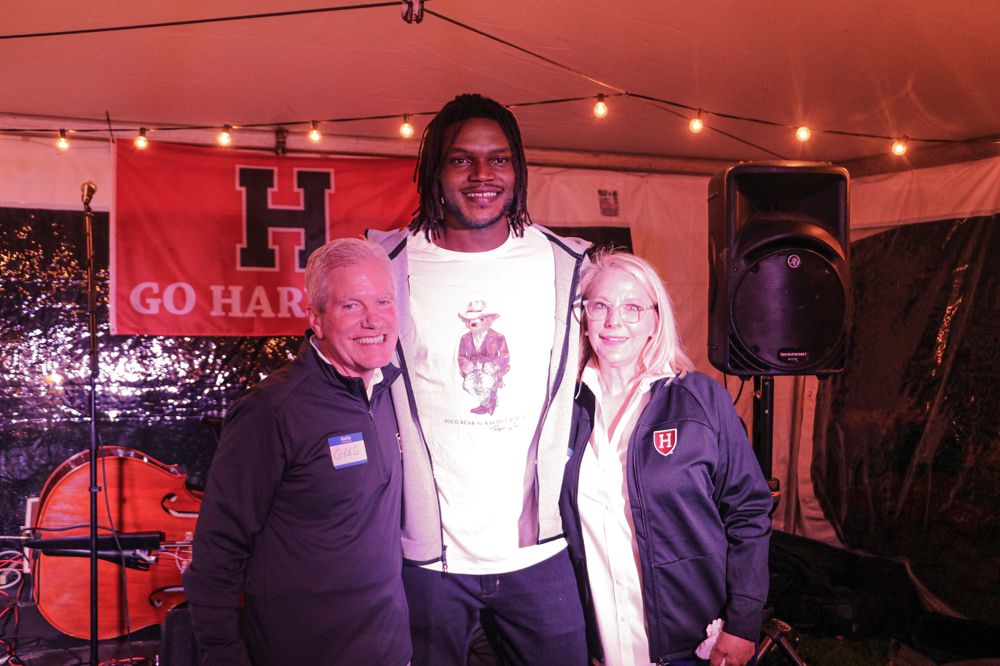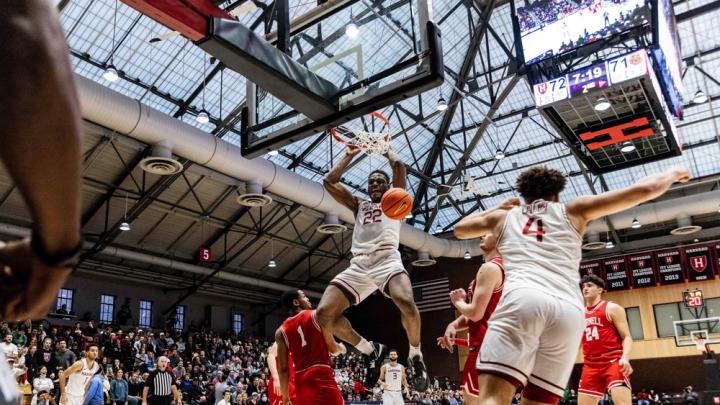Last December, with just under four minutes remaining in the second half, the Harvard men’s basketball team trailed fourth-ranked Kansas by just nine points when Jayhawks guard Bobby Pettiford exploded toward the hoop. Crimson forward Justice Ajogbor ’24 slid over and leapt to deter Pettiford, who passed to teammate KJ Adams Jr. Adams appeared to have an open dunk, until Ajogbor turned and jumped again to block him. Instead, it was Harvard’s Chris Ledlum ’23 who ended up with a basket, rushing down the court for a fast-break layup off Ajogbor’s block.
In that moment, playing against a top-five team in one of college basketball’s iconic arenas, Ajogbor dictated the action. But the apparent ease with which he changed that play belies his improbable journey to become a Division I player and one of the Ivy League’s best shot blockers.

Long before Ajogbor was swatting dunk attempts, he was a young boy in Nigeria grappling with the death of his parents, who passed away when he was about nine. (According to a Boston Globe story, his mother died from a stroke; Ajogbor never learned how his father died.) The youngest of six children, Ajogbor lived with his oldest sister and dreamed of becoming a doctor or judge, but his family had limited resources. “I knew early on,” he said, “I was going to have to find a way to create a better life for myself.”
Ajogbor took up basketball at 12 after seeing a kid at his church carrying a ball. At first, the sport provided an emotional release and a way to have fun. But after Ajogbor received formal coaching and attended a camp in Nigeria run by a local nonprofit that helps students identify educational opportunities in the United States, he was offered a chance to play basketball at Christ School near Asheville, North Carolina. He began his freshman year in 2016. Academically, the transition was difficult (he worked with tutors to catch up), but aspects of his new home felt familiar. He had long enjoyed country music, which had been brought to Nigeria by American missionaries, and in Asheville he developed an affinity for jazz and bluegrass. Most importantly, he had a stable support system in his host parents Gina and Greg Bridgeford, who encouraged him to spend his summers in Nigeria doing community service, including as a mentor at a youth basketball camp and coach’s clinic. “One of the values that was really important to my parents, the Bridgefords,” Ajogbor said, “was learning to reciprocate all of the goodwill that I’ve received.”

With time and work, Ajogbor became a high honor roll student and an elite basketball recruit, who stood out as a powerful frontcourt player. On defense, he could block and alter shots, and on offense, he drew opposing players to the basket, opening up shot opportunities for his teammates. He decided to attend Harvard after visiting campus and talking about Nigerian history with Fletcher University Professor Henry Louis Gates Jr., who had spent time in Benin City, Ajogbor’s hometown. The meeting was arranged by Stemberg Coach Tommy Amaker, and Ajogbor took it as a sign he’d be supported at Harvard. Amaker was similarly enthusiastic about the young player. It didn’t hurt that Ajogbor was six-foot-10 and 250 pounds and a growing talent. In addition, the coach says, he sensed there was “a deep purpose about him.”
Ajogbor arrived on campus in August 2020 amid the COVID-19 pandemic, which wiped out the 2020-2021 basketball season. In 2021, just before his sophomore year, he tore his posterior cruciate ligament (PCL), which sidelined him for all but six late-season games, in which he felt pressure “to try to make up for lost time.” During the offseason, the coaches encouraged him to slow his pace and to practice playing more patiently in the post. In Nigeria, Ajogbor had watched YouTube videos to try to imitate fellow countryman Hakeem Olajuwon, one of the best centers in NBA history. Now, he honed his ability to shoot with either hand near the basket and refined his moves to counter the defense, from jump hooks to drop steps—which, in his case, often lead to ferocious dunks.
Last season, Ajogbor joined the starting lineup and showed off his improved prowess in a November victory over Elon when he caught a pass between two defenders in the post, scored, and drew a foul. (The game was part of a tournament in Ashville, an opportunity for Ajogbor to show his teammates his hometown, including a dinner at the Bridgefords with a bluegrass band.) Nevertheless, after the team’s home opener (a win over Siena) later that month, Amaker implored Ajogbor to be more aggressive on defense. “Justice is the biggest guy not just on the court,” the coach emphasized, “but in the whole facility.”
The message got through. Fourteen seconds into the next game against Loyola Chicago, a Ramblers guard cruised toward the basket and tried to go up for layup. In swooped Ajogbor, who swung his arm and slapped the ball off the backboard. He’d been studying the other player’s body language, something Ajogbor does often to find shot-blocking opportunities.
Basketball of course is the ultimate team sport, and Ajogbor’s shot-blocking matters because it energizes the entire Crimson team. On the perimeter, Harvard’s guards can pressure the opponent, knowing, he says, “they’re going to have someone behind them who is going to have their back.” If an opposing player does get past a guard and Ajogbor blocks him, it can jumpstart the offense. For example, in the first minute of Harvard’s 2022-23 Ivy League opener on New Year’s Eve against Princeton, the Tigers’ Caden Pierce leapt for a dunk. Ajogbor blocked the shot to guard Evan Nelson ’25, who dribbled up the floor and found guard Sam Silverstein ’24 for a three-pointer.
Last season, Ajogbor tied for third in the league with 1.4 blocks per game and received the team’s Most Improved Player Award. During the men’s basketball team’s four-game Canadian tour this past August, he averaged 8.3 points per game and was the leading rebounder and shot blocker. For Harvard to compete for an Ivy League championship (the Crimson placed seventh last year), he will need to continue that production.
After graduation, Ajogbor, an economics concentrator who made the National Association of Basketball Coaches Honors Court for academic excellence, will have one year of remaining collegiate eligibility. But for now, his focus is on preparing for the season opener on November 6 against the University of Massachusetts-Boston.








